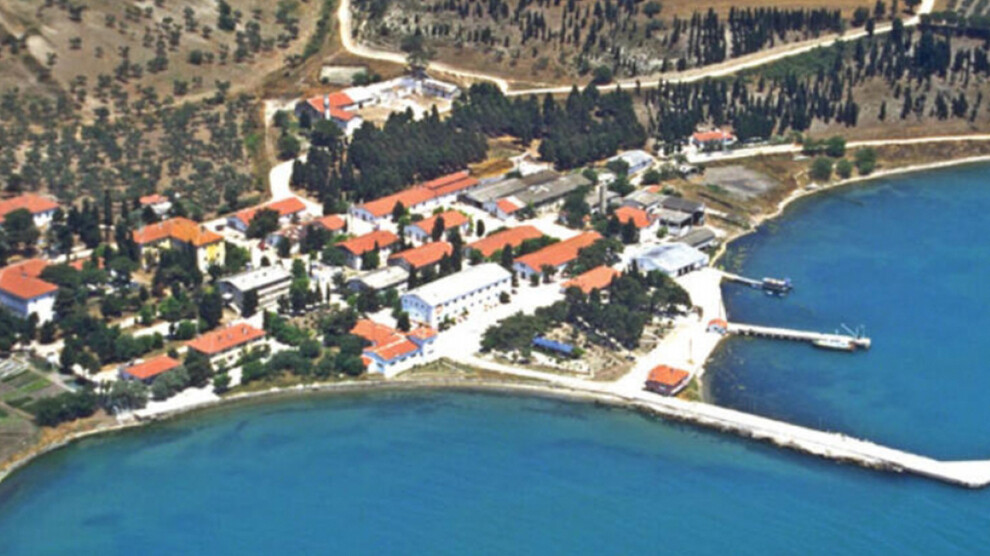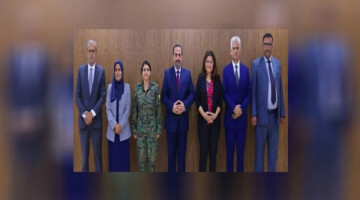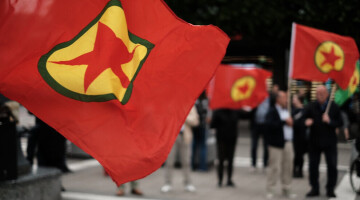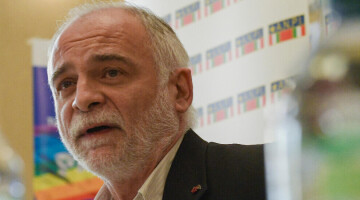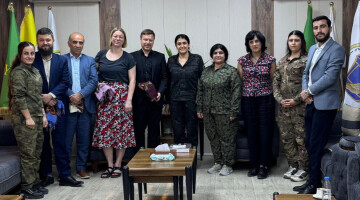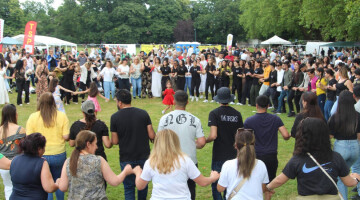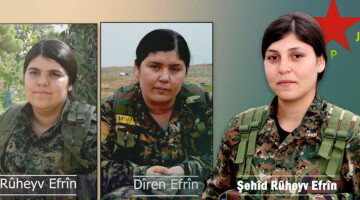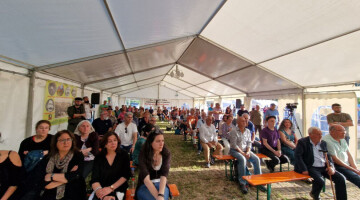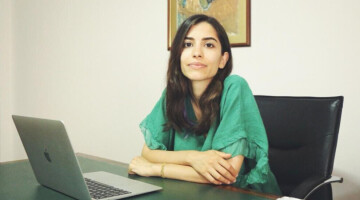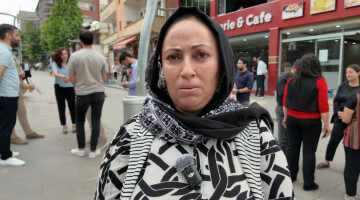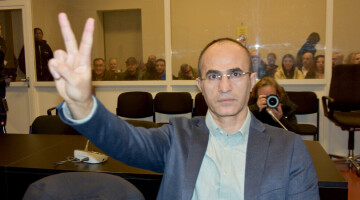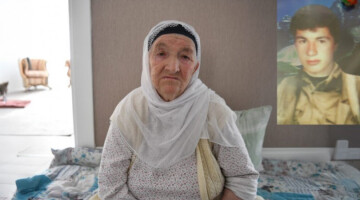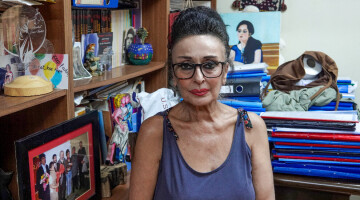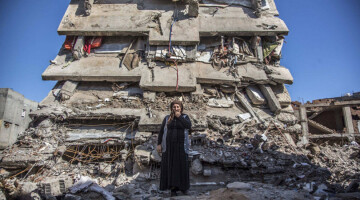Kurdish People's Leader Abdullah Öcalan, Ömer Hayri Konar, Hamili Yıldırım and Veysi Aktaş have been held in absolute isolation in İmralı for nearly three years without any news.
Rights and legal organisations applied to the the Committee for the Prevention of Torture (CPT) regarding the prevention of the Imrali prisoners' meetings with their lawyers in violation of Turkey's international commitments.
The bar associations of Diyarbakır, Hakkari, Mardin, Batman, Muş, Şırnak Urfa and Van, the Association of Lawyers for Freedom, Progressive Lawyers’ Association, Association of Civil Society in the Penal System, Foundation for Society and Legal studies, Human Rights Association, Human Rights Foundation of Turkey submitted the application, which states the following:
“Esteemed members of the European Committee for the Prevention of Torture and Inhuman or Degrading Treatment or Punishment,
We are writing to you concerning Abdullah Öcalan, Ömer Hayri Konar, Hamili Yıldırım and Veysi Aktaş, who are held in İmralı F Type High Security Prison where they have been prevented from seeing their lawyers in violation of Turkey’s international commitments.
We are writing to you regarding the prevention which keeps Abdullah Öcalan, Ömer Hayri Konar, Hamili Yıldırım and Veysi Aktaş who are held in the İmralı F-Type High Security Prison, from seeing their lawyers in a way which violates Turkey’s international commitments.While no positive response has been given to the requests of Abdullah Öcalan’s lawyers to visit their client since 7 August 2019, Veysi Aktaş, Hamili Yıldırım and Ömer Hayri Konar have not been able to see their lawyers even once since their transfer to İmralı Island in 2015.
The ban regarding visits to Abdullah Öcalan by his lawyers has been in effect for 8 years, from 27 July 2011 until 2 May 2019. In 2019, there were 5 visits by lawyers and then the uninterrupted ban was resumed after the last visit by lawyers on 7 August 2019.
In fact, since 15 February 1999, a special and discriminatory form of isolation/solitary confinement has been applied in the İmralı Prison, causing serious damage to the physical, mental and social integrity of the prisoners. As a matter of fact, this severe regime of isolation/solitary confinement is reflected in the report published on 5 August 2020 regarding your Committee’s visit to the İmralı Prison on 6-7 May 2019. While there are many findings of violations in your report, in paragraph 51, in relation to the lawyer and family visits, it is expressed that: “The CPT urges the Turkish authorities to take the necessary steps to ensure that all prisoners at Imralı Prison are effectively able, if they so wish, to receive visits from their relatives and lawyers.
To this end, an end should be put to the practice of imposing a ban on family visits for ‘disciplinary’ reasons. Further, the Committee requests the Turkish authorities to provide – on a monthly basis – an account of the visits which all prisoners held at Imralı Prison have received from their family members and lawyers.” After your report, it was expected that there would be an improvement in the İmralı Prison in line with your recommendations, but new disciplinary punishments were imposed on the prisoners and new banning orders were issued by the Judgeship of Sentence Enforcement against the prisoners. Moreover, according to the United Nations Standard Minimum Rules for the Treatment of Prisoners (the Nelson Mandela Rules), prisoners subjected to disciplinary punishments have the right to apply for judicial remedies and to see their lawyers during this process (Article: 41/4-5), but the inmates of the İmralı Prison are not able to exercise this right.
On 14 March 2021, speculations about Abdullah Öcalan’s health began circulating on social media abd raised serious concerns among the public. The families were then granted the opportunity to communicate with their relatives in the İmralı Prison by phone on 25 March 2021. However, Abdullah Öcalan’s phone call with his brother was terminated within 3-4 minutes, and Ömer Hayri Konar and Veysi Aktaş were not able to talk to their families at all. Abdullah Öcalan’s brother shared with the public that in the short phone call, his brother had clearly and unambiguously expressed his wish to see his lawyers.
On 26 May 2021, 768 lawyers, including active members and executives of many bar associations and law and human rights organisations in Turkey, made a public declaration regarding the ban on lawyer visits in which they criticised the severe degree of isolation in practice in the İmralı PrisonFurthermore, on 10 June 2022, 775 lawyers affiliated to 29 bar associations in Turkey applied to the Bursa Chief Public Prosecutor's Office with a certificate of authorisation and requested that lawyers be granted access, but the Chief Public Prosecutor's Office did not respond to this application.
Likewise, 350 lawyers from 22 countries, especially European countries, applied to the Ministry of Justice on 14 September 2022 and 756 lawyers from different countries in the Middle East applied to the Ministry of Justice on 19 September 2022, requesting access to the İmralı Island Prison for a visit. No response was given to these applications either.
It is not possible for us, law and human rights organisations, which conduct visits to many prisons, write reports and make statements in order to identify and prevent rights violations in prisons, to visit the İmralı Prison due to the special execution regime in practice, which is also included in the reports of your Committee.
The ban on lawyer visits which is in practice in the İmralı Prison is in clear contravention of the United Nations Standard Minimum Rules for the Treatment of Prisoners (the Nelson Mandela Rules), updated in 2015, the recommendations of your Committee and the Law on the Execution of Sentences and Security Measures (Law No. 5275). We would like to kindly remind that states have an obligation to ensure that persons held in prisons enjoy their rights regardless of their identity, political opinion, religious and ethnic identity, gender, sexual orientation, and the nature of their conviction.
In the meantime, in view of the persistence of severe isolation/solitary confinement conditions and the lack of any news from the İmralı Prison, the Human Rights Association, the Civil Society in the Penal System Association, the Human Rights Foundation of Turkey, the Association of Contemporary Lawyers and the Association of Lawyers for Freedom submitted an application to your Committee in September 2021, requesting that a visit to the İmralı Prison be undertaken.
On the other hand, upon the application of the lawyers of Abdullah Öcalan, Ömer Hayri Konar, Hamili Yıldırım and Veysi Aktaş, the United Nations Human Rights Committee decided in September 2022 to request for an interim measure to be taken so that the applicants can meet with the lawyers of their choice without any restriction, but Turkey did not fulfil the requirements of this decision either. In January 2023, after the lawyers had informed the United Nations Human Rights Committee of the continuing absence of information, the Committee reminded Turkey of the request for an interim measure, but Turkey failed to comply with it.
The CPT last visited Turkey on 20-29 September 2022. It was communicated that this visit also involved an ad-hoc visit to İmralı Prison. However, the 32nd Annual General Report, published in March 2023, does not include any detailed explanations regarding this visit, but simply notes that “particular attention was paid to the communal activities offered to the prisoners and contact with the outside world.”
It is known that your Committee has made 11 separate visits to the İmralı Prison since 1999. Your Committee, which is the only international mechanism that has so far been able to conduct interviews in the İmralı Prison, is also the closest witness to the deterioration in the conditions of execution during this period of more than 24 years. However, we have the impression that the fact that the Committee did not make any public statement about its 2022 visit, and that it has not executed any procedures against Turkey despite the fact that the violations identified in its reports were not eliminated later on, encourages Turkey to carry on with its practices that contradict its international commitments.
At the current stage, due to the fact that Turkey’s practices in the İmralı Prison have become chronic, that the prisoners’ incommunicado state has aggravated with every passing day, that there has been no change in the conditions in the İmralı Prison since the CPT’s report of 5 August 2020, that not a single lawyer visit has taken place since August 2019, and that the inmates of İmralı Prison have not been heard from since the short phone call in March 2021, we believe that it would be meaningful for the Committee to consider executing the procedure stipulated in Article 10 § 2 of the European Convention for the Prevention of Torture and Inhuman or Degrading Treatment or Punishment.
Concerning the aggravation of the inmates’ prolonged incommunicado detention in the İmralı Prison and the lack of any change in their conditions, we, the undersigned legal and human rights organisations, request the Committee, in line with its mandate and responsibility under the Convention,
1- to conduct an “urgent” visit to the İmralı Prison and disclose the findings and reports to the public;
2- to ensure that lawyer visits take place immediately and that these visits continue, and that they are no longer restricted through unlawful court decisions;
3- to ensure that family and legal guardian visits take place and that these visits continue, and that they are no longer restricted through unlawful disciplinary penalties;
4- in parallel to the establishment of the right to receive visitors, to ensure that the applicants are able to exercise their right to communicate by phone on a routine basis;
5- to ensure that all restrictions on means of communication with the outside world and with the prisoners’ lawyers, such as letter, telegram, and fax, are lifted;
6- to ensure the end of de facto restrictions and unlawful practices regarding access to newspapers, magazines and books,
7- to take necessary steps for the Committee’s report and findings regarding its last visit to the İmralı Prison to be shared with the public as soon as possible,
8- to take the necessary measures to eliminate the conditions of torture and other inhuman and ill-treatment and the prisoners’ incommunicado detention and to execute the procedures set out in Article 10/2 of the Convention in the event that the request mentioned in the previous point is not met.”

